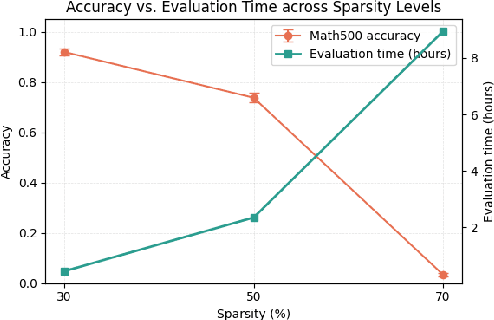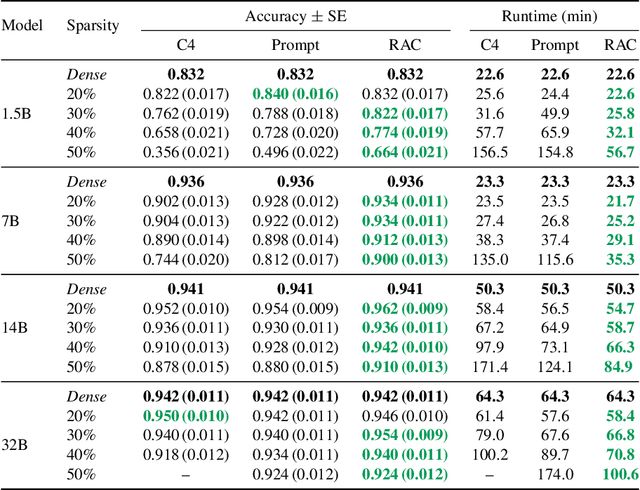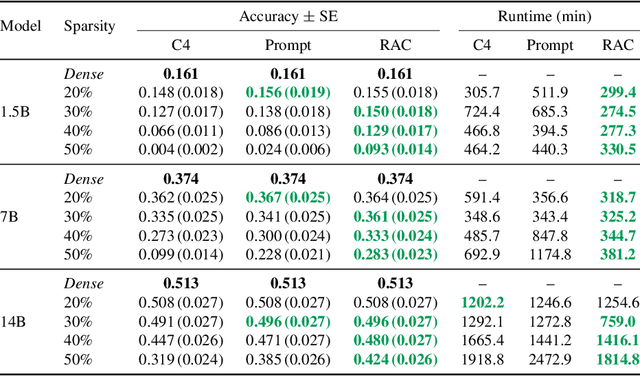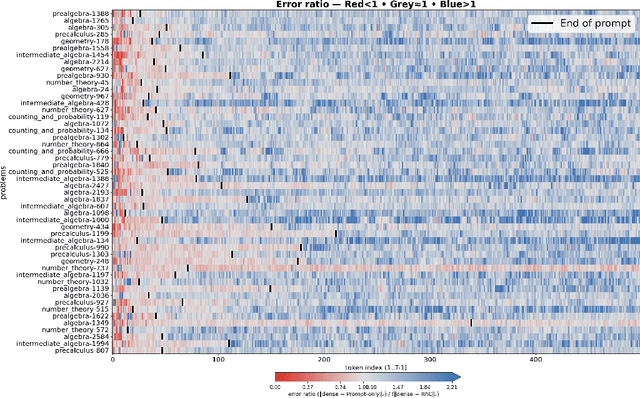Shao Tang
Distilling the Essence: Efficient Reasoning Distillation via Sequence Truncation
Dec 24, 2025Abstract:Distilling the reasoning capabilities from a large language model (LLM) to a smaller student model often involves training on substantial amounts of reasoning data. However, distillation over lengthy sequences with prompt (P), chain-of-thought (CoT), and answer (A) segments makes the process computationally expensive. In this work, we investigate how the allocation of supervision across different segments (P, CoT, A) affects student performance. Our analysis shows that selective knowledge distillation over only the CoT tokens can be effective when the prompt and answer information is encompassed by it. Building on this insight, we establish a truncation protocol to quantify computation-quality tradeoffs as a function of sequence length. We observe that training on only the first $50\%$ of tokens of every training sequence can retain, on average, $\approx94\%$ of full-sequence performance on math benchmarks while reducing training time, memory usage, and FLOPs by about $50\%$ each. These findings suggest that reasoning distillation benefits from prioritizing early reasoning tokens and provides a simple lever for computation-quality tradeoffs. Codes are available at https://github.com/weiruichen01/distilling-the-essence.
Reasoning Models Can be Accurately Pruned Via Chain-of-Thought Reconstruction
Sep 15, 2025



Abstract:Reasoning language models such as DeepSeek-R1 produce long chain-of-thought traces during inference time which make them costly to deploy at scale. We show that using compression techniques such as neural network pruning produces greater performance loss than in typical language modeling tasks, and in some cases can make the model slower since they cause the model to produce more thinking tokens but with worse performance. We show that this is partly due to the fact that standard LLM pruning methods often focus on input reconstruction, whereas reasoning is a decode-dominated task. We introduce a simple, drop-in fix: during pruning we jointly reconstruct activations from the input and the model's on-policy chain-of-thought traces. This "Reasoning-Aware Compression" (RAC) integrates seamlessly into existing pruning workflows such as SparseGPT, and boosts their performance significantly. Code reproducing the results in the paper can be found at: https://github.com/RyanLucas3/RAC
LiDDA: Data Driven Attribution at LinkedIn
May 14, 2025Abstract:Data Driven Attribution, which assigns conversion credits to marketing interactions based on causal patterns learned from data, is the foundation of modern marketing intelligence and vital to any marketing businesses and advertising platform. In this paper, we introduce a unified transformer-based attribution approach that can handle member-level data, aggregate-level data, and integration of external macro factors. We detail the large scale implementation of the approach at LinkedIn, showcasing significant impact. We also share learning and insights that are broadly applicable to the marketing and ad tech fields.
On the Robustness of Reward Models for Language Model Alignment
May 12, 2025Abstract:The Bradley-Terry (BT) model is widely practiced in reward modeling for reinforcement learning with human feedback (RLHF). Despite its effectiveness, reward models (RMs) trained with BT model loss are prone to over-optimization, losing generalizability to unseen input distributions. In this paper, we study the cause of over-optimization in RM training and its downstream effects on the RLHF procedure, accentuating the importance of distributional robustness of RMs in unseen data. First, we show that the excessive dispersion of hidden state norms is the main source of over-optimization. Then, we propose batch-wise sum-to-zero regularization (BSR) to enforce zero-centered reward sum per batch, constraining the rewards with extreme magnitudes. We assess the impact of BSR in improving robustness in RMs through four scenarios of over-optimization, where BSR consistently manifests better robustness. Subsequently, we compare the plain BT model and BSR on RLHF training and empirically show that robust RMs better align the policy to the gold preference model. Finally, we apply BSR to high-quality data and models, which surpasses state-of-the-art RMs in the 8B scale by adding more than 5% in complex preference prediction tasks. By conducting RLOO training with 8B RMs, AlpacaEval 2.0 reduces generation length by 40% while adding a 7% increase in win rate, further highlighting that robustness in RMs induces robustness in RLHF training. We release the code, data, and models: https://github.com/LinkedIn-XFACT/RM-Robustness.
Efficient AI in Practice: Training and Deployment of Efficient LLMs for Industry Applications
Feb 20, 2025Abstract:Large language models (LLMs) have demonstrated remarkable performance across a wide range of industrial applications, from search and recommendations to generative tasks. Although scaling laws indicate that larger models generally yield better generalization and performance, their substantial computational requirements often render them impractical for many real-world scenarios at scale. In this paper, we present methods and insights for training small language models (SLMs) that deliver high performance and efficiency in deployment. We focus on two key techniques: (1) knowledge distillation and (2) model compression via quantization and pruning. These approaches enable SLMs to retain much of the quality of their larger counterparts while significantly reducing training, serving costs, and latency. We detail the impact of these techniques on a variety of use cases at a large professional social network platform and share deployment lessons - including hardware optimization strategies that enhance speed and throughput for both predictive and reasoning-based applications.
From Features to Transformers: Redefining Ranking for Scalable Impact
Feb 05, 2025Abstract:We present LiGR, a large-scale ranking framework developed at LinkedIn that brings state-of-the-art transformer-based modeling architectures into production. We introduce a modified transformer architecture that incorporates learned normalization and simultaneous set-wise attention to user history and ranked items. This architecture enables several breakthrough achievements, including: (1) the deprecation of most manually designed feature engineering, outperforming the prior state-of-the-art system using only few features (compared to hundreds in the baseline), (2) validation of the scaling law for ranking systems, showing improved performance with larger models, more training data, and longer context sequences, and (3) simultaneous joint scoring of items in a set-wise manner, leading to automated improvements in diversity. To enable efficient serving of large ranking models, we describe techniques to scale inference effectively using single-pass processing of user history and set-wise attention. We also summarize key insights from various ablation studies and A/B tests, highlighting the most impactful technical approaches.
AlphaPO -- Reward shape matters for LLM alignment
Jan 07, 2025Abstract:Reinforcement Learning with Human Feedback (RLHF) and its variants have made huge strides toward the effective alignment of large language models (LLMs) to follow instructions and reflect human values. More recently, Direct Alignment Algorithms (DAAs) have emerged in which the reward modeling stage of RLHF is skipped by characterizing the reward directly as a function of the policy being learned. Examples include Direct Preference Optimization (DPO) and Simple Preference Optimization (SimPO). These methods often suffer from likelihood displacement, a phenomenon by which the probabilities of preferred responses are often reduced undesirably. In this paper, we argue that, for DAAs the reward (function) shape matters. We introduce AlphaPO, a new DAA method that leverages an $\alpha$-parameter to help change the shape of the reward function beyond the standard log reward. AlphaPO helps maintain fine-grained control over likelihood displacement and over-optimization. Compared to SimPO, one of the best performing DAAs, AlphaPO leads to about 7\% to 10\% relative improvement in alignment performance for the instruct versions of Mistral-7B and Llama3-8B. The analysis and results presented highlight the importance of the reward shape, and how one can systematically change it to affect training dynamics, as well as improve alignment performance.
Liger Kernel: Efficient Triton Kernels for LLM Training
Oct 14, 2024



Abstract:Training Large Language Models (LLMs) efficiently at scale presents a formidable challenge, driven by their ever-increasing computational demands and the need for enhanced performance. In this work, we introduce Liger-Kernel, an open-sourced set of Triton kernels developed specifically for LLM training. With kernel optimization techniques like kernel operation fusing and input chunking, our kernels achieve on average a 20% increase in training throughput and a 60% reduction in GPU memory usage for popular LLMs compared to HuggingFace implementations. In addition, Liger-Kernel is designed with modularity, accessibility, and adaptability in mind, catering to both casual and expert users. Comprehensive benchmarks and integration tests are built in to ensure compatibility, performance, correctness, and convergence across diverse computing environments and model architectures. The source code is available under a permissive license at: github.com/linkedin/Liger-Kernel.
Iterative proportional scaling revisited: a modern optimization perspective
Jul 02, 2018



Abstract:This paper revisits the classic iterative proportional scaling (IPS) from a modern optimization perspective. In contrast to the criticisms made in the literature, we show that based on a coordinate descent characterization, IPS can be slightly modified to deliver coefficient estimates, and from a majorization-minimization standpoint, IPS can be extended to handle log-affine models with features not necessarily binary-valued or nonnegative. Furthermore, some state-of-the-art optimization techniques such as block-wise computation, randomization and momentum-based acceleration can be employed to provide more scalable IPS algorithms, as well as some regularized variants of IPS for concurrent feature selection.
Indirect Gaussian Graph Learning beyond Gaussianity
Oct 25, 2016



Abstract:This paper studies how to capture dependency graph structures from real data which may not be multivariate Gaussian. Starting from marginal loss functions not necessarily derived from probability distributions, we use an additive over-parametrization with shrinkage to incorporate variable dependencies into the criterion. An iterative Gaussian graph learning algorithm is proposed with ease in implementation. Statistical analysis shows that with the error measured in terms of a proper Bregman divergence, the estimators have fast rate of convergence. Real-life examples in different settings are given to demonstrate the efficacy of the proposed methodology.
 Add to Chrome
Add to Chrome Add to Firefox
Add to Firefox Add to Edge
Add to Edge